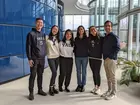
Yale Team Wins John R. Lewis Racial Justice Case Competition
Named for the late civil rights activist and politician, the case competition challenges students to find innovative solutions to dismantle structural racism and racial inequality in business.
A team of Yale students, including five first-year MBA students at Yale SOM, won the 2022 John R. Lewis Racial Justice Case Competition (JLCC) at Emory University’s Goizueta Business School, on January 21, besting teams from around the United States.
The winning team received a $20,000 prize, 50% of which will be donated to an organization of the team’s choosing that advances racial justice.
JLCC was founded by students at Goizueta in 2020 after the murder of George Floyd sparked a national movement for racial justice. Named for the late civil rights activist and politician, who represented Emory’s home city of Atlanta in the House of Representatives, the case competition invokes Lewis’ legacy to challenge students to find innovative solutions to dismantle structural racism and racial inequality in business. A Yale SOM team reached the competition’s finals in 2021.
The winning team, known as Team Javeln, included Anita Chiang ’23; Vivian Chong ’23; Josh Lam ’23; Laura Norato Prieto ’23; Eva Sachar, a master’s degree candidate in statistics at the Yale Graduate School of Arts & Sciences; and Nick Zeffiro ’23. Javeln tackled a problem posed by sponsor IBM’s Call for Code for Racial Justice, which challenged teams competing in the tech category to design and create an implementation plan for a physical hub dedicated to closing the racial tech gap in a specific American city. The team prepared for the challenge by conducting research on the racial gap in the tech industry and leveraging the expertise and advice of Yale SOM professors Tony Sheldon and Seth Zimmerman, as well as SOM alumni in tech.
In its winning entry, the team proposed a series of training and job-matching programs that could be provided at a central physical hub in Atlanta. Chong said, “We designed our programming to sustainably target the racial tech gaps that we had identified in our research, hoping to empower historically marginalized learners to enter the tech industry and thrive in their careers, creating a pipeline of leaders building products that accurately represent their needs and community.”
Notaro Prieto said that the team’s victory and the experience of participating in the case competition aligned with and complemented her time in the classroom at SOM: “This was an excellent opportunity to work with a diverse group of Yale classmates. It was great to see how our different backgrounds and shared passion for understanding the role of tech in society made it easier to ideate and design a proposal that tackled such a pressing issue. This victory was a reminder to keep Yale SOM’s mission front and center as we move ahead with our graduate journey.”
